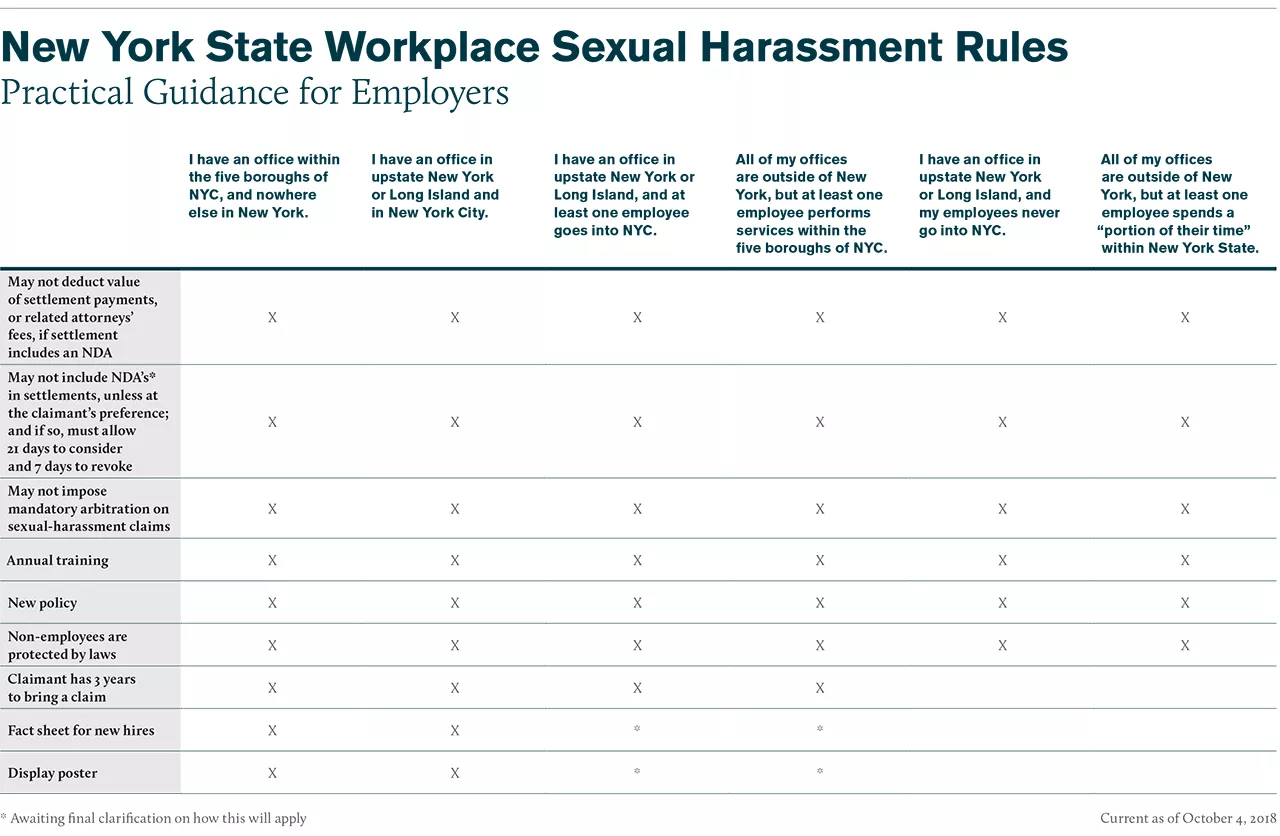New York State Announces Final Workplace Sexual Harassment Rules
What This Means for You
On October 1, 2018, the New York State Department of Labor announced its final regulations to prevent workplace harassment.
This is on top of implications from the federal Tax Cuts and Jobs Act, enacted in December 2017, and New York City’s #Stop Sexual Harassment in NYC Act, enacted in May 2018. The analysis below integrates recent changes from federal, NY State, and NY City authorities to provide a holistic picture of what this all really means for employers.

Click here to download the chart.
Settling A Claim Related to Sexual Harassment and Including a Non-Disclosure Provision:
If a settlement for sexual-harassment includes a non-disclosure agreement, employers may no longer deduct the amount of the settlement, nor attorneys’ fees related to the settlement.
Within New York State, employers may only include non-disclosure agreements in settlement of sexual harassment claims if:
- Inclusion of a non-disclosure provision is the claimant’s preference; and
- The claimant is given 21 days to consider the agreement and 7 days post-execution to revoke acceptance.
Prohibition on Mandatory Arbitration of Sexual-Harassment Claims:
In New York State, while employers may still include mandatory-arbitration provisions in employment agreements or other documents, employers may no longer apply these provisions to sexual harassment claims. Any agreements that do include these claims will be declared null and void to the extent that they purport to include sexual-harassment claims, and they will not be enforced.
Providing Annual Trainings:
The first annual training must be completed by October 9, 2019. We strongly recommend holding your training well before the deadline, as effective trainings are a potential key way to minimize legal vulnerability.
In New York, if an employer already conducted a compliant training earlier in 2018, the employer need not hold a new training. If the prior training was only partially compliant, the employer will need to hold a “supplemental” training, to fill in the gaps before October 9, 2019.
Employers with offices located within and outside the State do not need to train the employees in out-of-state offices, unless those employees spend “a portion of their time” in New York State.
The training must be “interactive.” Examples include:
- Web-based training that includes questions at the end of each section; or
- Web-based training that includes the opportunity for employees to submit questions online and receive responses in a timely manner; or
- In-person training in which a presenter asks questions of employee-participants, or gives them time to ask questions during the training; or
- For any training, including a feedback survey for employees to submit after the training.
The final NY State rules encourages employers to hold additional, separate trainings for managers or supervisors beyond the training used for all other employees.
Given the prohibition on deducting the cost of sexual-harassment settlements that include non-disclosure agreements, and related attorney’s fees, it is more important than ever that employers remain fully committed to avoiding exposure to a claim of workplace sexual harassment. We recommend the use of live trainers for the trainings for managers and supervisors, to enhance the likelihood they will truly understand how to identify and address the problem before it becomes a significant issue or litigation.
Implementing a New Policy
All New York State employers are required to implement a new policy, in compliance with State requirements, by October 9, 2018. Employers must distribute, in writing or via email, a particularly detailed policy which describes examples of sexual harassment, forums for redress, investigation procedures, a statement against retaliation, and other information.
Employers must also create a standard complaint form for employees to report workplace sexual harassment. The policy must indicate where employees can find the complaint form.
Protection for Non-Employees:
The New York State law protects all individuals who are sexually harassed in the workplace, whether or not they are on your payroll. If anyone in that category, such as a contractor, consultant, volunteer, or unpaid intern, is sexually harassed by your employees in your or their workplace, your company could be held liable.
Three Years to Bring a Claim:
New York City currently requires all claims under the New York City Human Rights Law to be brought within one year of the interaction that led to the claim. However, if a claimant makes an allegation of gender-based discrimination (which includes, but is not limited to, sexual harassment), the claimant now has three years to bring that claim.
New Hires:
Fact Sheet: All new hires in New York City must be provided with this fact sheet upon commencement of work.
Poster Display: All New York City employers must display this poster in the workplace.
New-Hire Trainings: New hires in upstate New York and Long Island must undergo training “as soon as possible.” For new hires working in NYC, the training is only required once they have been employed for 90 days, and have worked within the five boroughs for at least 80 hours in the current calendar year.
The training requirement for a new hire is deemed satisfied if that new hire can verify that he/she has undergone training with a previous employer in the same calendar year. However, the burden is still on the new employer to ensure that the employee is familiar with the new policies and his/her responsibilities under them.
Please Note: The NYC Commission on Human Rights has not yet clarified whether employers located outside of New York City, who have at least one employee performing work within the five boroughs, will be required to provide fact sheets and display the poster.
Contacts
- Related Practices
-
Read Time
6Minutes
